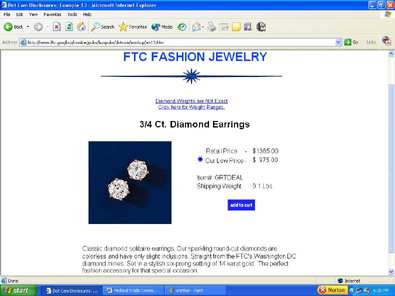Federal Trade Commission advice for Internet advertisers: 'Dot Com Disclosures'

The Federal Trade Commission (FTC) reminds that “fraud and deception are unlawful no matter what the medium” with its “Dot Com Disclosures.” According to the FTC:
The Internet combines aspects of print, television, and radio advertising in an interactive environment, and while it presents a new and fast-paced experience for consumers, it also raises interesting—and occasionally complex—questions about the applicability of laws that were developed long before "dot com" became a household phrase. The FTC has examined how its own consumer protection rules and guides apply to advertising and sales made via the Internet.
Below is a sample Do and a sample Don’t from the FTC "Dot Com Disclosures":
DO: The descriptive hyperlink in the ad below is placed adjacent to the 3/4 carat diamond weight claim. This helps to ensure that consumers notice the link and relate it to the testimonial.

DON'T: Because many of the experiences described in testimonials may not be typical of what consumers generally will experience with the product, a disclosure regarding this fact is needed. The hyperlink in the screen below, "Disclaimer," does not indicate that the testimonial claims are qualified and does not indicate what consumers can expect to learn by clicking on it.